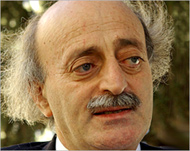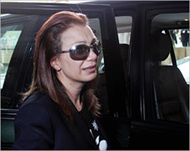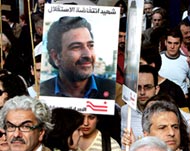UN inspectors set to return to Lebanon
UN Secretary-General Kofi Annan is to send a UN mission back to Lebanon to ensure all Syrian forces have withdrawn, amid reports that Syrian intelligence agents remain.

The UN mission will check on the status of implementation of Resolution 1559, passed by the Security Council in September, demanding the pullout of all Syrian forces from Lebanon, Annan’s spokesman Fred Eckhard said on Friday.
“No date has yet been set,” said Eckhard. He said the mission would have the same mandate as the earlier one led by Annan’s special envoy Terje Roed-Larsen.
A UN verification mission had reported on 23 May that Syria had fully withdrawn from its neighbour, in compliance with the resolution passed last year.
US President George Bush also stepped up pressure on Damascus after a Lebanese opposition figure said Syrian intelligence agents remained in Lebanon and additional political murders could be expected.
In a television interview late on Thursday night, Lebanon’s Druze leader Walid Jumblatt said the entire opposition was being targeted, repeating an accusation he has often made since the murder in February of former premier Rafiq al-Hariri.
“The assassinations will continue with or without the knowledge of Syrian President Bashar al-Assad,” he said.
Jumblatt spoke only a week after the latest political killing, of prominent anti-Syrian journalist Samir Kassir, and his comments were swiftly echoed by US officials, including Bush.
Message to Damascus
Annan said on Thursday Roed-Larsen would deliver a message from the secretary-general when he meets al-Assad in Damascus.
 |
|
Jumblatt says the assassinations |
Roed-Larsen will have discussions with al-Assad on developments on the ground and will report back next week, Annan said.
On Friday, Bush called for Damascus to pull its intelligence services out of Lebanon, adding that he was disturbed by reports of their presence in Lebanon.
“Our message to Syria – and it’s not just the message of the
United States, the United Nations has said the same thing – is that in order for Lebanon to be free,” Syria needs to “not only remove their military, but to remove intelligence officers as well”.
Syria’s decision to pull all its forces out of Lebanon came after the 14 February assassination of former Lebanese prime minister al-Hariri, blamed by many on the then-Lebanese government and its political masters in Damascus.
Al-Hariri’s death, which sparked widespread protests that brought down the government in Lebanon in late February, prompted the UN to launch an international commission to investigate the killing.
Kassir investigation
On Thursday, the widow of prominent Lebanese journalist Kassir, who was murdered on 2 June, said she was seeking a criminal investigation by authorities from France, where her husband also held nationality, complaining that the Lebanese inquiry had been incompetent.
 |
|
Kassir’s widow Gisele Khuri is |
“I have made a formal complaint in France because Samir had French nationality and to benefit from the competence of French justice,” Gisele Khuri, a journalist with Al-Arabiya television, said.
Khuri took advantage of a French law allowing her to file a complaint against “person or persons unknown”.
US Federal Bureau of Investigation and French police experts arrived in Beirut at the Lebanese government’s request, after Kassir was killed on by a bomb placed in his car outside the couple’s Beirut home.
‘Total incompetence’
Sources close to the investigation said the French and American experts had described the initial investigation as one of total incompetence after detecting major flaws.
“I do not want to accuse anyone,” Khuri said, “but it is obvious that the methods of Lebanese investigators are archaic.
“The preliminary international inquest into Rafiq Hariri’s assassination underlined that, and the interior minister at the time, Suleiman Frangieh, acknowledged it.”
She added: “I do not want other failures resulting from the incompetence of the local authorities to jeopardise the course of the investigation and to prevent justice from being done.”
Crime scene
Sources close to the investigation said Lebanese investigators had been too quick to clear the crime scene. In particular, they were faulted for having removed the car too quickly, resulting in the bomb’s detonator not being recovered.
 |
|
Demonstrators in Paris observe |
They were also criticised for not having performed an autopsy immediately, saying that made it more difficult to determine the type of explosive used, and to trace infrared signals from the transmitter, also not found, that detonated the explosive.
An autopsy was conducted after the insistence of the family, in the presence of the French experts, six days after the crime.
An initial UN report into al-Hariri’s murder, issued in late March, said “there was a distinct lack of commitment on the part of the Lebanese authorities to investigate the crime effectively”.
It also claimed there may have even been illegal manipulation of some evidence.